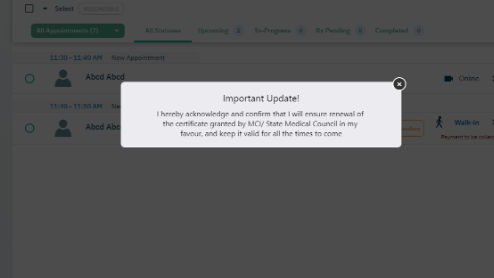Heart Conditions
Which Diseases Can Be Diagnosed By Checking Heart Rate?
9 min read
By Apollo Pharmacy, Published on - 31 July 2023, Updated on - 19 September 2023
Share this article
0
0 like

Heart rate is an essential vital sign that provides valuable information about our overall health. Monitoring our heart rate can help detect various diseases and conditions. By assessing heart rate, healthcare professionals can identify abnormalities and provide prompt treatment when needed. Several diseases such as Bradycardia, Tachycardia, Atrial Fibrillation, Hypertension, and Thyroid Disorders can be determined by checking the heart rate. Let's know more about it.
What is a Heart Rate?
Heart rate measures the number of times our heart beats per minute (bpm). By understanding heart rate and its significance, we can identify potential health conditions and make informed decisions about our well-being.
Heart rate can be measured using a variety of methods, including manually counting the pulse at the wrist or neck, or using a device such as a heart rate monitor. The measurement indicates the efficiency of our heart in pumping blood throughout the body.
What is the Normal Range of Heart Rate?
The normal resting heart rate for adults typically ranges between 60 to 100 bpm. However, athletes or individuals who engage in regular exercise may have a lower resting heart rate, which is considered a sign of good cardiovascular fitness.
Factors affecting heart rate:
- Physical activity
- Stress and anxiety
- Medications
- High body temperature
- Dehydration
Correlation between Heart Rate and Cardiovascular Diseases
A normal heart rate typically ranges between 60 and 100 beats per minute. However, a heart rate that falls outside this range could indicate an underlying health condition. It is essential to understand the correlation between heart rate and cardiovascular diseases.
1. High Resting Heart Rate (Tachycardia)
A high resting heart rate, also known as tachycardia, is a condition where the heart beats more than 100 times per minute at rest. Several factors can cause tachycardia, such as stress, anxiety, or certain medications.
However, it can also be a symptom of some cardiovascular diseases such as hypertension (high blood pressure) and coronary artery disease (blockage in the arteries supplying blood to the heart). These conditions can increase the risk of heart attacks and strokes.
Diagnostic tests and treatment options:
- To diagnose tachycardia and related cardiovascular diseases, doctors may conduct diagnostic tests such as electrocardiogram (ECG), echocardiogram, stress test, or Holter monitor.
- Treatment options may include lifestyle modifications, medications, or medical procedures like catheter ablation.
2. Low Resting Heart Rate (Bradycardia)
Bradycardia is defined as a resting heart rate that falls below 60 beats per minute. There are several potential causes of bradycardia, including certain medications, underactive thyroid glands, and heart rhythm disorders.
However, bradycardia can also be a symptom of other cardiovascular diseases such as arrhythmias (abnormal heart rhythms) or heart block (occurs when the electrical signals in the heart are blocked or slowed down).
Diagnostic tests and treatment options:
- To diagnose bradycardia, your healthcare provider may recommend an electrocardiogram (ECG) to measure the electrical activity of the heart and an echocardiography to assess the structure and function of the heart.
- Treatment options for bradycardia depend on the severity and underlying cause of the condition.
Correlation between Heart Rate and Nervous System Disorders
Several conditions such as diabetes and Parkinson's disease can affect the autonomic nervous system, leading to abnormal heart rate variability (HRV) patterns. HRV is the variation in time intervals between consecutive heartbeats. It is an essential measure of the autonomic nervous system's function and overall cardiovascular health.
By tracking HRV through wearable devices or specialised tests, doctors can assess autonomic function and identify any abnormalities. Early detection allows for timely intervention and personalised treatment plans to improve outcomes.
Infectious Diseases and Heart Rate Abnormalities
Infections are one of the many factors that can lead to abnormalities in heart rate. Common infections that can cause an elevated heart rate include:
1. Common viral infections
Viruses such as influenza and COVID-19 can cause an increase in heart rate as they affect the body's immune response. Monitoring heart rate during these infections can provide valuable information about the severity of the illness.
2. Bacterial infections
Severe bacterial infections, like sepsis, can also lead to an elevated heart rate. Sepsis is a life-threatening condition that occurs when the body's response to infection becomes dysregulated. Measuring heart rate is one way clinicians evaluate the severity of sepsis.
Some infections that can lead to a decreased heart rate include:
1. Viral myocarditis
This viral infection affects the heart muscle, leading to inflammation and potentially decreasing the heart rate. Common symptoms include chest pain, fatigue, and shortness of breath.
2. Lyme disease
Transmitted through tick bites, Lyme disease can affect multiple body systems, including the heart. In some cases, it can cause an irregular heartbeat or bradycardia.
Endocrine Disorders and Heart Rate Irregularities
Endocrine disorders that may result in irregular heart rate include:
1. Hyperthyroidism
One of the diseases that can be determined by checking heart rate is hyperthyroidism, a condition caused by an overactive thyroid gland. In this condition, the thyroid gland produces excessive amounts of thyroid hormones, which can lead to an accelerated heart rate.
The elevated levels of thyroid hormones increase the sensitivity of the heart to adrenaline, leading to an increase in heart rate. This can result in palpitations, rapid heartbeat, and irregular heart rhythms.
How to manage thyroid function and heart rate?
The primary goal is to restore normal thyroid hormone levels and control the symptoms. Treatment options may include antithyroid medications, radioactive iodine therapy, or surgery to remove part or all of the thyroid gland.
2. Hypothyroidism
Hypothyroidism is a condition in which the thyroid gland does not produce enough thyroid hormone. In hypothyroidism, the heart rate tends to slow down, resulting in a condition called bradycardia. Bradycardia can increase the risk of cardiovascular problems such as heart disease, high blood pressure, and heart failure.
How to manage thyroid function and heart rate?
The treatment for hypothyroidism involves taking synthetic thyroid hormone medication. This helps to normalise the thyroid hormone levels in the body and can help regulate the heart rate.
Psychological Conditions and Heart Rate Associations
Psychological conditions that can have a significant impact on heart rate include:
1. Anxiety
Individuals with higher levels of anxiety may have reduced HRV. Reduced HRV is often associated with an increased risk of cardiovascular diseases.
Strategies for managing anxiety and heart rate fluctuations
- If you're experiencing anxiety-related heart rate fluctuations, it's essential to seek professional help from a mental health specialist who can provide appropriate treatment strategies.
- Some effective techniques for managing anxiety and controlling heart rate include deep breathing exercises, meditation, and mindfulness-based stress reduction.
- Regular physical exercise is also known to reduce anxiety symptoms and improve cardiovascular health.
2. Depression
When someone is experiencing depression, their heart rate can fluctuate. Some individuals may have a higher resting heart rate, while others may have a lower heart rate. These changes are believed to be linked to the dysregulation of the autonomic nervous system, which controls the body's involuntary functions, including heart rate.
Treatment for depression-related heart rate abnormalities
Treatment options for addressing depression-related heart rate abnormalities typically involve a combination of medication, such as antidepressants or beta-blockers, and psychotherapy.
Lifestyle Factors and Heart Rate Patterns
Let's take a closer look at how lifestyle factors and heart rate patterns are interconnected.
1. Exercise
When you engage in physical activity, your heart rate naturally increases to supply oxygen-rich blood to your muscles. However, certain conditions, such as exercise-induced arrhythmias, can cause irregular heart rate patterns during exercise.
Exercise recommendations for optimising heart rate
- Regular exercise is essential for maintaining a healthy heart rate.
- Aim for at least 150 minutes of moderate-intensity aerobic exercise or 75 minutes of vigorous-intensity aerobic exercise per week.
- If you continuously experience irregular heart rates while exercising, consult a heart specialist.
2. Diet and heart rate regulation
Certain nutrients, such as caffeine, can temporarily increase heart rate. Therefore, excessive consumption should be avoided to maintain a normal heart rate.
Heart-healthy diet suggestions for maintaining optimal heart rate
- Consume a diet rich in fruits, vegetables, whole grains, lean proteins, and low-fat dairy products.
- Limit sodium intake to prevent fluid retention and high blood pressure.
- Avoid trans fats and saturated fats found in processed foods, fried foods, and fatty meats.
Other Medical Conditions and Heart Rate
1. Anaemia and its effect on heart rate
Anaemia is a medical condition characterised by a deficiency in red blood cells or insufficient haemoglobin levels in the blood. When the body experiences anaemia, the heart has to work harder to pump oxygenated blood throughout the body. As a result, the heart rate may increase to compensate for the decreased oxygen-carrying capacity of the blood.
The treatment of anaemia involves iron supplementation or medications to stimulate red blood cell production. In severe cases, blood transfusions may be necessary.
2. Medications that can influence heart rate
Certain medications can influence heart rate and alter its rhythm. Common medications like beta-blockers and stimulants can influence the heart rate.
It is important to monitor and manage medication-induced heart rate alterations under the guidance of a healthcare professional. Regular check-ups and periodic adjustments in medication dosages can help maintain a healthy heart rate.
Takeaway
Heart rate is a vital sign that can provide valuable information about our health. While it doesn't directly diagnose specific diseases, an abnormal heart rate can be an indicator of an underlying condition. It's important to note that a single measurement of heart rate may not provide a definitive diagnosis. Consult a healthcare professional if you have concerns about your heart rate or if you notice any persistent abnormalities.
A BP monitor can help detect your heart rate.
FAQs
Q. What is considered a normal heart rate?
A normal resting heart rate for adults typically ranges between 60 to 100 beats per minute.
Q. Are there any lifestyle factors that can affect heart rate?
Yes, several lifestyle factors can influence heart rate, including physical activity, stress levels, caffeine and alcohol consumption, certain medications, and overall fitness level.
Q. What is considered a dangerous heart rate?
Extremely low or high heart rates can be dangerous. A heart rate below 40 or above 120 beats per minute at rest should be evaluated by a healthcare professional.
Q. How can I check my heart rate?
You can check your heart rate by placing two fingers (index and middle fingers) on your wrist (radial pulse) or neck (carotid pulse) and counting the number of beats for 1 minute or 30 seconds (multiply by 2).
Q. When should I seek medical attention for an abnormal heart rate?
If you experience persistent or severe symptoms along with an abnormal heart rate, such as chest pain, dizziness, or shortness of breath, it is important to seek medical attention.
Heart Conditions
Consult Top Cardiologists
View AllLeave Comment
Recommended for you

Heart Conditions
Warning Signs of an Imminent Heart Problem
Often, the very first sign that something is wrong with heart health is a heart attack.

Heart Conditions
Is Your Chest Feeling Tight And Heavy? These Could Be The Reasons
Tightness or heaviness in your chest can be a result of several issues such as injury, infection, anxiety, lung conditions, digestive issues and cardiovascular conditions. Such symptoms should be reported to the doctor immediately.

Heart Conditions
Coronary Artery Disease: Symptoms, Cause, Diagnosis, Treatment, Prevention
Understand the symptoms, causes, diagnosis, treatment, and prevention of coronary artery disease to ensure a healthy heart. Stay informed about the latest guidelines, technologies, and lifestyle factors to reduce your risk.
Subscribe
Sign up for our free Health Library Daily Newsletter
Get doctor-approved health tips, news, and more.
Visual Stories

World Heart Day 2021: Take charge of your health
Tap to continue exploring
Recommended for you

Heart Conditions
Warning Signs of an Imminent Heart Problem
Often, the very first sign that something is wrong with heart health is a heart attack.

Heart Conditions
Is Your Chest Feeling Tight And Heavy? These Could Be The Reasons
Tightness or heaviness in your chest can be a result of several issues such as injury, infection, anxiety, lung conditions, digestive issues and cardiovascular conditions. Such symptoms should be reported to the doctor immediately.

Heart Conditions
Coronary Artery Disease: Symptoms, Cause, Diagnosis, Treatment, Prevention
Understand the symptoms, causes, diagnosis, treatment, and prevention of coronary artery disease to ensure a healthy heart. Stay informed about the latest guidelines, technologies, and lifestyle factors to reduce your risk.
